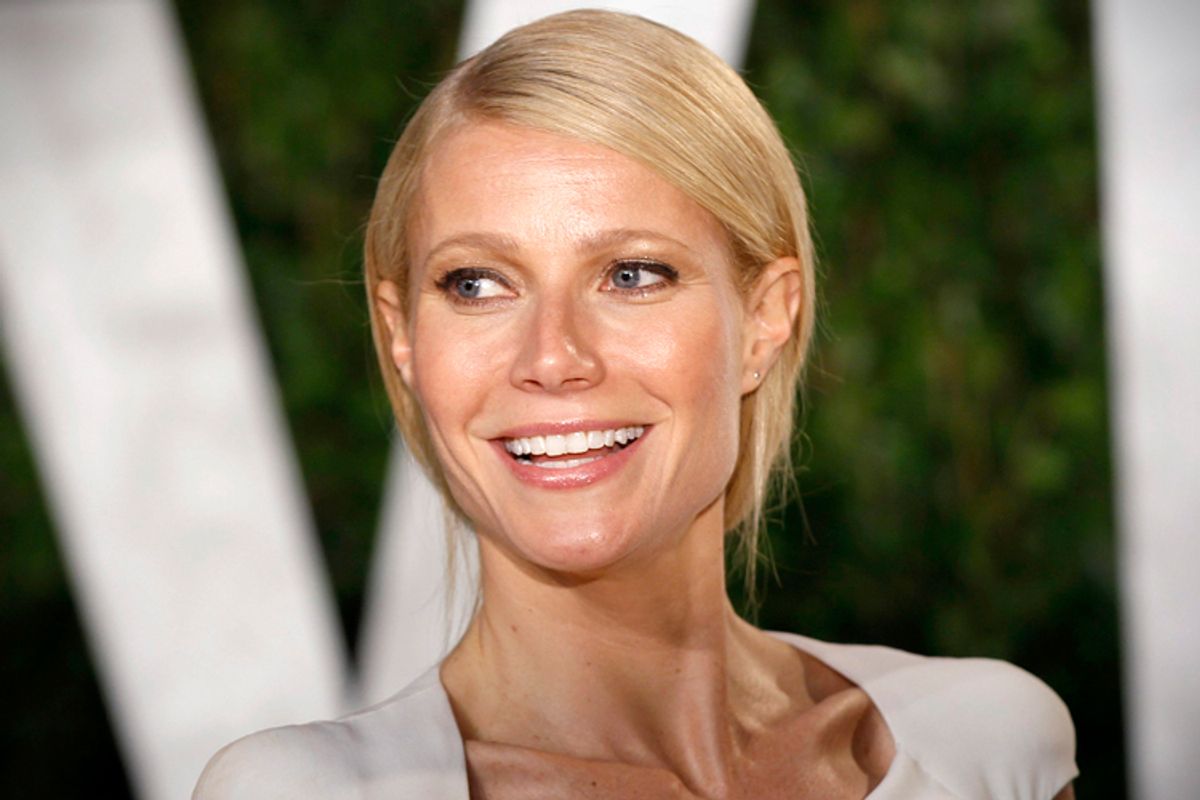Even a woman who looks like she has it all knows what it is to lose something. In a revealing interview for the Daily Mail's You magazine, actress, cookbook author and effortlessly perfect human Gwyneth Paltrow revealed this week the miscarriage that made her rethink her family plans.
Paltrow is circumspect about when the pregnancy occurred and exactly how it ended. Just a year ago, she casually brushed off questions about whether she wanted more children, saying, "I don’t know if I can go back to diapers and things like that. I’m so past that, I think I may have missed the window. I think maybe when Moses was 3 I would have done it." Now, however, she says, "My children ask me to have a baby all the time. And you never know, I could squeeze one more in. I am missing my third. I’m thinking about it. But I had a really bad experience when I was pregnant with my third. It didn't work out and I nearly died. So I am like, 'Are we good here or should we go back and try again?'" Paltrow's cryptic reference to the child she says she's "missing" comes within the context of a conversation about her healthy new "It’s All Good" cookbook, which she claims sprang out of a health crisis in which "I was vitamin-D deficient, I had anemia, I had thyroid issues, my liver was congested, I had hormonal imbalances and a benign tumor on my ovary that had to be removed."
Celebrity culture is obsessed with motherhood and babies. Every supermarket tabloid, every entertainment show, devotes lavish attention to any female between the age of 16 and 50 who might be "Finally!" knocked up, who's showing off her baby bump, who's rocking a post-baby hot bod, and of course, what an amaaaaaazing and fulfiiiiiilllling and perrrrrrfect experience motherhood is. The harder, darker aspects of bringing people into the world are kept quieter. If we hear about them at all, it's almost always in the distance of time. Earlier this year, Jay-Z revealed that he and wife Beyoncé had a pregnancy loss before the birth of their daughter, Blue Ivy, via a new song that referenced "false alarms and false starts… last time the miscarriage was so tragic." And in her recently aired "Life Is But a Dream" documentary, Beyoncé spoke of the "pain and trauma" of the loss.
It's not always easy to acknowledge miscarriage, and the complex feelings it stirs up. The world is too full of well-meaning friends who shrug that you should just try again, as well as callous individuals like the Daily Mail commenters who noted, "You are NOT a special martyr for having had a miscarriage" and "It happens to hundreds of thousands of women every day." It's true that it does. Up to a quarter of all known pregnancies end in miscarriage – and the figure is even higher for very early pregnancies.
But just because you've got a lot of company doesn't automatically negate the loss of one unique pregnancy, one hoped-for child. The experience of miscarriage can be physically painful and emotionally shocking. It's no lightly brushed off thing to have your body go out of control on you, to experience the helplessness of loss. It can be profoundly heartbreaking to go from giddy expectation to sudden emptiness. And it can feel cruelly lonely, because the pregnant woman was likely not yet showing, because the couple may not even have made the news public. And when all you're left with is the feeling that as far as everybody else is concerned, that child you loved and imagined and carried for a short time didn't even exist, it can hurt like hell. It can hurt in a way that's unlike any other hurt in life.
It's a leap of faith to decide to have a child, and it's one that's inevitably influenced by past experince. So if the 40-year-old Paltrow, who has everything else in life – including an Oscar and a 33-room home in London -- isn't jumping on the whole women's magazine script of "40, Fabulous, and Pregnant!" who can blame her? In that regard, she doesn't fit neatly into the smiling, sunny image we have of what motherhood – especially celebrity motherhood – is supposed to be. Instead she acknowledges the truth -- that sometimes experience is punctuated with grief and disappointment, and ultimately, a whole lot of ambivalence about whether it's worth the risk.



Shares